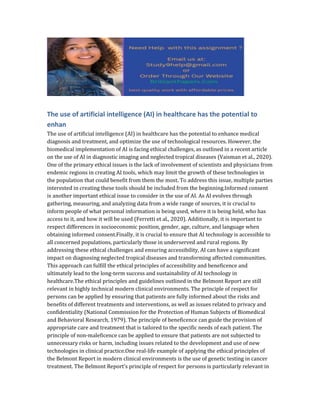
The use of artificial intelligence in healthcare has the potential.docx
- 1. The use of artificial intelligence (AI) in healthcare has the potential to enhan The use of artificial intelligence (AI) in healthcare has the potential to enhance medical diagnosis and treatment, and optimize the use of technological resources. However, the biomedical implementation of AI is facing ethical challenges, as outlined in a recent article on the use of AI in diagnostic imaging and neglected tropical diseases (Vaisman et al., 2020). One of the primary ethical issues is the lack of involvement of scientists and physicians from endemic regions in creating AI tools, which may limit the growth of these technologies in the population that could benefit from them the most. To address this issue, multiple parties interested in creating these tools should be included from the beginning.Informed consent is another important ethical issue to consider in the use of AI. As AI evolves through gathering, measuring, and analyzing data from a wide range of sources, it is crucial to inform people of what personal information is being used, where it is being held, who has access to it, and how it will be used (Ferretti et al., 2020). Additionally, it is important to respect differences in socioeconomic position, gender, age, culture, and language when obtaining informed consent.Finally, it is crucial to ensure that AI technology is accessible to all concerned populations, particularly those in underserved and rural regions. By addressing these ethical challenges and ensuring accessibility, AI can have a significant impact on diagnosing neglected tropical diseases and transforming affected communities. This approach can fulfill the ethical principles of accessibility and beneficence and ultimately lead to the long-term success and sustainability of AI technology in healthcare.The ethical principles and guidelines outlined in the Belmont Report are still relevant in highly technical modern clinical environments. The principle of respect for persons can be applied by ensuring that patients are fully informed about the risks and benefits of different treatments and interventions, as well as issues related to privacy and confidentiality (National Commission for the Protection of Human Subjects of Biomedical and Behavioral Research, 1979). The principle of beneficence can guide the provision of appropriate care and treatment that is tailored to the specific needs of each patient. The principle of non-maleficence can be applied to ensure that patients are not subjected to unnecessary risks or harm, including issues related to the development and use of new technologies in clinical practice.One real-life example of applying the ethical principles of the Belmont Report in modern clinical environments is the use of genetic testing in cancer treatment. The Belmont Report’s principle of respect for persons is particularly relevant in
- 2. this context. Patients must be fully informed about the risks and benefits of genetic testing, including the potential psychological and social consequences of learning that they have a genetic mutation. Additionally, patients must have the option to refuse testing if they choose to do so. The principle of beneficence is also critical in the use of genetic testing in cancer treatment. For example, doctors may use the results of genetic testing to inform treatment decisions, such as whether to use a specific drug that targets a specific genetic mutation. This approach allows for more personalized and effective cancer treatment. The principle of non-maleficence is also important in the use of genetic testing. Patients must be protected from harm resulting from the use of genetic testing, including issues related to genetic discrimination and confidentiality (National Institutes of Health, 2020).ReferencesFerretti, A., Ienca, M., Hurst, S., & Vayena, E. (2020). Big Data, Biomedical Research, and Ethics Review: New Challenges for IRBs. Ethics & Human Research, 42(5), 17–28. https://doi.org/10.1002/eahr.500065National Commission for the Protection of Human Subjects of Biomedical and Behavioral Research. (1979). The Belmont Report: Ethical principles and guidelines for the protection of human subjects of research. Retrieved fromhttps://www.hhs.gov/ohrp/regulations-and-policy/belmont- report/index.htmlNational Institutes of Health. (2020, December 17). Genetics of cancer. National Cancer Institute. Retrieved fromhttps://www.cancer.gov/about-cancer/causes- prevention/geneticsVaisman, A., Linder, N., Lundin, J., Orchanian-Cheff, A., Coulibaly, J. T., Ephraim, R. K., & Bogoch, I. I. (2020). Artificial intelligence, diagnostic imaging and neglected tropical diseases: ethical implications. Bulletin of the World Health Organization, 98(4), 288–289. https://doi.org/10.2471/BLT.19.237560 this is was qoutionPlease read the following article:Vaisman, A., Linder, N., Lundin, J., Orchanian-Cheff, A., Coulibaly, J. T., Ephraim, R. K. D., & Bogoch, I. I. (2020). Artificial intelligence, diagnostic imaging and neglected tropical diseases: Ethical implications. World Health Organization: Bulletin of the World Health Organization, 98(4), 288-289. http://dx.doi.org/10.2471/BLT.19.237560Address the following requirements:Discuss some of the primary ethical challenges that biomedical researchers encounter in the face of emerging technology?How can the ethical principles and protocols of the Belmont Report address modern ethical concerns and issues in highly technical modern clinical environments?Ensure to provide either a real-life example or realistic scenario for your proof of concept.